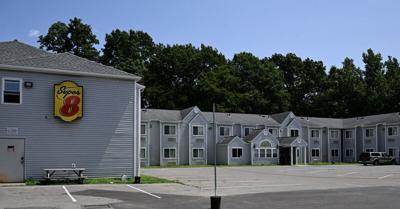During a downright nasty town meeting in July, several angry Rotterdam residents demanded that 230-plus asylum seekers who’d arrived unexpectedly at the Super 8 motel in town be referred to as “illegals” and “criminals.”
But in the months since?
While there have been easily resolved noise complaints at the Carman Road motel, Rotterdam police have yet to arrest any of the migrants, according to Police Chief Michael Brown.
“We stepped up patrols early on and we continue to do that, and we’re not seeing criminal activity,” Brown told me.
Indeed, five months after multiple buses came to Rotterdam from New York City carrying asylum seekers from countries such as Venezuela, Colombia, Haiti and China, it seems the fear surrounding their presence simply was not warranted.
Nationally, immigration is a critical issue, and migrant crossings at the southern border are reaching record levels and stretching resources, according to reporting this week by The New York Times.
In addition, the Albany Times Union reported this week that the influx of migrants has cost New York state $2 billion.
Clearly, we need action at the federal level.
But that doesn’t justify the baseless nativist claims we heard in local communities over the summer.
And in Rotterdam, at least, the new arrivals have integrated fairly seamlessly into the community.
Within the Mohonasen Central School District, which welcomed about 70 asylum seekers in September, some residents fretted about how the new students would affect the district, specifically, how the migrants may drive up local expenses.
While the state funding is yet to be finalized, Mohonasen expects to be reimbursed for the extra money in reserve funds the district spent on the asylum seekers this year, according to Superintendent Shannon Shine.
“Our regular Foundation Aid projections do show retroactive funding for our English Language Learners,” Shine said. “They are weighted, similarly to students with disabilities, such that we should receive more aid per student than for ‘regular’ needs students.”
Sure, that means state taxpayers are likely to split the tab, but that’s a much lower burden than local residents being saddled with the entire bill, as some feared.
In addition to the questions about funding, Shine said he personally had worries about the way the new students would be treated. But those fears haven’t come to fruition, either.
“What I was most worried about was that the ugly side of things would rear its head,” Shine told me in an interview earlier this month. The superintendent feared that the asylum seekers, who are “not engaged in any politics” and are just “here to try to find a better life” could be at risk of physical and verbal abuse.
Instead, rather than being shunned or bullied, the new students, which still total about 70 after some families have left and other families have arrived, have been largely embraced.
“It's gone well. The students are very happy to be in school,” Shine said.
Migrant students are forming bonds and enrolling in clubs and athletics. One student recently stood out for his skills in a new drone soccer program.
“I would say that the students are assimilating,” Shine said.
That matches what a Venezuelan father of two boys – one in high school, the other in middle school – told me in October.
“The kids want to know about them and want to practice Spanish with them, and then they are teaching them English, so it’s symbiotic,” the father told me through an interpreter of his sons making friends at their new schools.
So was all that fear mongering in July really worthwhile?
No doubt, the way the busloads of migrants arrived without warning deserved skepticism and frustration.
And much of the ire should be directed toward DocGo, the medical company that has contracted with New York City to facilitate the relocation of migrants from Manhattan to upstate communities, for its poor communication and haphazard operation, which hit a low in August when their representatives alienated helpful volunteers because they’d collected too many donations.
But even after a bumpy beginning, life with the asylum seekers seems to be going generally well in Rotterdam.
“In a nutshell, things are going good,” Superintendent Shine told me.
Has it been perfect? Of course not.
For instance, many, including Gov. Kathy Hochul, would like to see the work-permitting process expedited so asylum seekers across the state can find employment, which would not only allow them to afford lives outside hotels but would also help fill abundant job vacancies.
And at Mohonasen, school leaders had to scramble to hire and train staff to accommodate an influx of English Language Learners that more than doubled the amount of such students all at once.
The district remains in need of staffing and is contemplating adding an English as a New Language teacher to its current staff of five.
“We are now using a teacher who is not certified in ENL as a temporary solution to replace the ENL teacher who recently moved back to his home country, but the position is currently posted and we are hoping to find an ENL certified teacher as soon as possible. Currently, we have no applicants,” Shine said.
Still, “we're further ahead than I probably would have predicted, given the level of these challenges,” Shine said.
The superintendent said he understands some of the trepidation residents expressed over the summer.
“Anytime you have the unknown or something different, or that you don't understand then there's a level of apprehension,” he said. “You layer on top of that that this is a huge political football at the federal level, the state level, in New York City, and in upstate communities.”
But while an issue like the arrival of the migrants can test people’s patience and tolerance, “it also brings out the best in people,” he said.
Truly, that’s what we’ve seen in Rotterdam, where volunteers have stepped up to provide the asylum seekers everything from food and warm winter clothing to assistance with filling out school enrollment forms.
“You could see that some of the asylum-seeking families had never experienced such unsolicited kindness,” Shine said of witnessing this support. “And that kindness has actually continued.”
When asked how many people have shown up to recent school board meetings to discuss the new arrivals, Shine said, “not a one.”
Thankfully, five months after Rotterdam witnessed so much vitriol and outrage in response to migrants coming to a motel, it’s been kindness that has endured.









